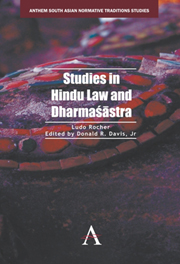Book contents
- Frontmatter
- Contents
- Foreword by Richard W. Lariviere
- Preface
- Abbreviations
- Note on the Edition
- Introduction
- PART ONE THE NATURE OF HINDU LAW
- PART TWO GENERAL TOPICS OF HINDU LAW
- PART THREE HINDU LEGAL PROCEDURE
- PART FOUR TECHNICAL STUDIES OF HINDU LAW
- Possession Held for Three Generations by Persons Related to the Owner
- The Vīramitrodaya on the Right of Private Defence
- The Technical Term Anubandha in Sanskrit Legal Literature
- The Kāmasūtra: Vātsyāyana's Attitude toward Dharma and Dharmaśāstra
- In Defense of Jīmūtavāhana
- Dāsadāsī
- The Definition of Vākparuṣya
- Janmasvatvavāda and Uparamasvatvavāda: The First Chapters on Inheritance in the Mitākṣarā and Dāyabhāga
- Karma and Rebirth in the Dharmaśāstras
- Notes on the Technical Term Sāhasa: “Fine, Pecuniary Penalty”
- Avyāvahārika Debts and Kautilya 3.1.1–11
- The Sūtras and Śāstras on the Eight Types of Marriage
- Caritraṃ Pustakaraṇe
- The Terms Niyukta, Aniyukta, and Niyoga in Sanskrit Legal Literature
- The Aurasa Son
- The Introduction of the Gautamadharmasūtra
- PART FIVE ANGLO-HINDU AND CUSTOMARY LAW
- Bibliography
- Index
The Terms Niyukta, Aniyukta, and Niyoga in Sanskrit Legal Literature
from PART FOUR - TECHNICAL STUDIES OF HINDU LAW
Published online by Cambridge University Press: 05 February 2013
- Frontmatter
- Contents
- Foreword by Richard W. Lariviere
- Preface
- Abbreviations
- Note on the Edition
- Introduction
- PART ONE THE NATURE OF HINDU LAW
- PART TWO GENERAL TOPICS OF HINDU LAW
- PART THREE HINDU LEGAL PROCEDURE
- PART FOUR TECHNICAL STUDIES OF HINDU LAW
- Possession Held for Three Generations by Persons Related to the Owner
- The Vīramitrodaya on the Right of Private Defence
- The Technical Term Anubandha in Sanskrit Legal Literature
- The Kāmasūtra: Vātsyāyana's Attitude toward Dharma and Dharmaśāstra
- In Defense of Jīmūtavāhana
- Dāsadāsī
- The Definition of Vākparuṣya
- Janmasvatvavāda and Uparamasvatvavāda: The First Chapters on Inheritance in the Mitākṣarā and Dāyabhāga
- Karma and Rebirth in the Dharmaśāstras
- Notes on the Technical Term Sāhasa: “Fine, Pecuniary Penalty”
- Avyāvahārika Debts and Kautilya 3.1.1–11
- The Sūtras and Śāstras on the Eight Types of Marriage
- Caritraṃ Pustakaraṇe
- The Terms Niyukta, Aniyukta, and Niyoga in Sanskrit Legal Literature
- The Aurasa Son
- The Introduction of the Gautamadharmasūtra
- PART FIVE ANGLO-HINDU AND CUSTOMARY LAW
- Bibliography
- Index
Summary
I
Students of classical Hindu law usually distinguish two different kinds of judges in the law courts of the ancient Indian kingdoms: judges who are niyukta “appointed (by the king),” and judges who are aniyukta “not appointed (by the king).” For instance, the “Index of the important Sanskrit words” in the Dharmakośa interprets niyukta as “appointed” (1.1: 33), and, more explicitly, aniyukta as “not appointed, an assessor of a court who has not been formally appointed and is not entitled to vote” (1.1: 3–4; apparently from Monier-Williams’ dictionary).
This distinction is based on information drawn from the Sanskrit commentaries. Thus, in his commentary on YDh 2.2, Vijnāneśvara quotes KS 56 (DhK 60a):
saprāḑvivākaḥ sāmātyaḥ sabrāhmaṇapurohitaḥ
sasabhyaḥ prekṣako rājā svarge tiṣṭhati dharmataḥ;
to account for the simultaneous presence in this stanza of the two terms brāhmaṇa and sabhya, he draws the following distinction: tatra brāhmaṇā aniyuktāḥ sabhāsadas tu niyuktā iti bhedaḥ. And, since different terminology presupposes different responsibilities, the author of the Mitākṣarā adds:
tatra niyuktānāṃ yathāvasthitārthakathane ‘pi yadi rājānyathā karoti tadāsau nivāraṇīyo'nyathā doṣaḥ… aniyuktānām punar anyathābhidhāne ‘nabhidhāne vā doṣo na tu rājno ‘nivāraṇe.
This and similar distinctions are perpetuated in modern scholarly literature. Says Kane (1930–1962: 3.274):
The chief justice (prāḑvivāka) with the Sabhyas constituted the Court, being appointed (niyukta) by the king. It was stated above that the king was to enter the Hall of Justice with the chief justice, Sabhyas and Brāhmaṇas. […]
- Type
- Chapter
- Information
- Studies in Hindu Law and Dharmasastra , pp. 603 - 612Publisher: Anthem PressPrint publication year: 2012



